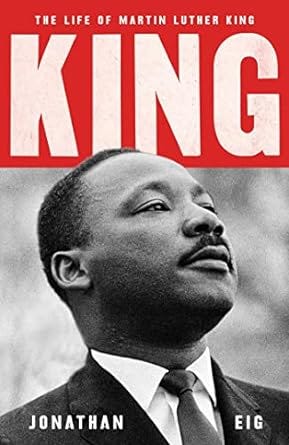I’ve said before that I think MLK is the most influential Christian that America has ever produced. Not Edwards, though I grant he is the most important theologian America has produced so far, and not Whitefield, who wasn’t really American anyway. But it remains the case that I, ignorant Australian as I am, have never really studied the history of the American Civil Rights movement. There’s so much about it I don’t know. I have been trying to rectify this in various pieces.
This book is the most recent and major biography of MLK. I can’t review it in comparison to other biographies, because I haven’t read any of them. What I can do is offer some reflections on MLK and on the emphases that this biography chose to bring out.
Firstly, Eig does a tremendous job of turning the research onto a man’s life into a vivid portrait. You get the broad sweep of life, the lively depiction of individual moments, the necessary background to understand his origins, and the zoomed in perspective of individual witnesses at specific moments. It’s a great book and a great read.
Eig does focus on certain aspects with particular attention. Of these, Eig takes considerable time at various points to highlight King’s way with women. This ranges from the huge number of women he apparently courted when a young man, through to the substantial allegations of serial unfaithfulness. On the one hand I do recognise that there is a preponderance of evidence in this direction. On the other, there is very little proof, and King’s wife Coretta has maintained to this very day that he was not unfaithful. Such judgments are beyond us. I will say on this score, however, that you find among white evangelicals a consistent dismissal of King as a liberal and an adulterer, whereas Jonathan Edwards as slaveholder and George Whitefield as slave advocate are passed over with little mention. We ought not excuse the sins of great heroes, but rather face them with searing honesty.
In this respect Eig is seeking to do something proper, as he writes in his final pages (I paraphrase): in hallowing King we have hollowed him. Hagiography, even of the modern kind, empties out the human. Eig’s King is a human one, at every step. The flaws and faults are not overly magnified, they’re just there to see. The plagiarism, which again may bother us, but reflects who he was, and also that King himself lived and operated in a cultural context around reuse of materials that differs.
Something else Eig brings out that I didn’t really appreciate was just how obsessed J. Edgar Hoover became with King, with surveilling him, opposing him, seeking to discredit him, harassing him. Eig clearly and firmly ties the acquiescence of the FBI under Hoover with the events that eventually lead to King’s assassination.
Another aspect that as someone born after the Vietnam war I have never really grasped, is just how horrific and recent segregationist America was. Horrendous racism is not so long past us. The conditions of Black Americans up to the 50s and 60s was abhorrent. And that is not so long ago. I remind people here that forms of slavery for Australian Indigenous people persisted into the 60s. This is not the distant past.
King’s life was singularly focused though. From his youth he understood himself to have a calling to oppose segregation and to fight for the rights, and freedoms, of African Americans. He did understand this as a divine mission. He drew deeply upon the wells of faith, the prophetic tradition, the Black church. He was a preacher through and through. There would be no civil rights movement without the Christian faith of the Black church that birthed it and sustained it, and I dare say it would not have survived nor succeeded without the embrace of King’s doctrine of non-violence.
I sometimes think that Gandhi was God’s providential gift to the church from outside the church. Gandhi, for all his failure to grasp the gospel of Jesus Christ, reckoned perhaps more than anyone, with the political and civil implications of Jesus’ teachings of non-violence, and formed them into a principled means of obedience and disobedience for social change. King, more than anyone, took that understanding back into the church, and put it to work in a just cause. His unwavering commitment to the moral superiority of their position, expressed in the moral commitment to non-violence, led to the foundations for the civil rights movement as he led it. There is much here we ought to pay heed to.
King was not a prophet, but he was a prophetic voice. He understood deeply the call of the OT prophets, and Jesus, to speak for justice and to call people to account. He laid down his life for that cause. I note with great sadness that the historic Voting Rights Act is being disabled and dismantled in the US today, nullified in its effects, which is leading to significant changes in electoral eligibility and district mapping, all of which disproportionally disenfranchises Black and other minority voters. King’s life won a great struggle, but the cause of justice is never done in this world.



Can’t wait to read this one. It’s on my list. Very insightful remarks here about the evangelical Australia receptions. And also about the gift of Gandhi. As always, much indebted to your thinking and reading, Seumas.